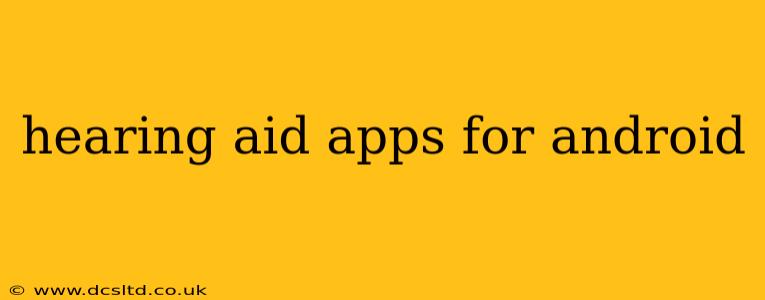Hearing loss affects millions, and technology is constantly evolving to provide better solutions. While a hearing aid from an audiologist remains the gold standard for significant hearing loss, numerous Android apps offer supplementary support and features to improve hearing experiences. This guide explores the various types of hearing aid apps available, addressing common questions and concerns.
What are the best hearing aid apps for Android?
This isn't a simple "best of" list because the ideal app depends heavily on individual needs and the type of hearing loss experienced. Some apps function as companions to specific hearing aids, while others offer features like sound amplification or noise reduction for those without hearing aids. Instead of a definitive ranking, let's explore categories and examples.
Hearing Aid Companion Apps:
Many hearing aid manufacturers offer companion apps that connect to their devices via Bluetooth. These apps allow users to:
- Adjust volume and settings: Fine-tune the hearing aid's performance based on the environment.
- Locate lost hearing aids: Utilize GPS or Bluetooth tracking features to find misplaced devices.
- Manage multiple devices: Control settings for multiple hearing aids simultaneously.
- Update firmware: Ensure the hearing aids are running the latest software for optimal performance.
- Access troubleshooting guides: Quickly find solutions to common problems.
Specific app names vary by manufacturer (e.g., Widex Moment, Starkey Thrive, Phonak myCall-to-Action). Check with your hearing aid provider for the appropriate app.
Sound Amplifier Apps:
These apps aim to amplify sounds for users with mild hearing loss who may not require medical-grade hearing aids. Important Note: These apps should not replace a professional hearing evaluation and fitting by an audiologist. Over-amplification can damage your hearing. Use caution and consult a healthcare professional before relying on these for extended periods.
Examples of sound amplifier apps are widely available on the Google Play Store. However, it's crucial to carefully read user reviews and understand the limitations of these apps before downloading.
Apps for Specific Hearing Conditions:
Some apps focus on specific challenges faced by individuals with particular types of hearing loss. For instance, apps designed for tinnitus may offer sound therapy or masking techniques. Others might focus on improving speech understanding in noisy environments. Again, a professional assessment is always advised to determine the appropriate approach to managing a hearing condition.
Do hearing aid apps work with all Android phones?
Compatibility varies. While most modern Android phones with Bluetooth support can connect to hearing aid apps, it's essential to verify compatibility with your specific phone model and the hearing aid or app you're using. Check the app's Google Play Store description for a list of compatible devices. Older Android phones might have limited compatibility.
Are there free hearing aid apps for Android?
Some apps offer basic features for free, but advanced functionalities often require a subscription or in-app purchases. Many hearing aid companion apps are free to download and use, provided you own the compatible hearing aids. However, subscription fees may be required for additional features or cloud storage. Always check the app's pricing model before downloading.
How to choose the right hearing aid app?
Consider the following factors:
- Type of hearing loss: If you have significant hearing loss, a hearing aid from a professional is necessary. Apps primarily offer supplementary benefits.
- Hearing aid compatibility: Ensure the app is compatible with your specific hearing aid model if using a companion app.
- Features: Identify the functionalities you need, such as volume adjustment, sound amplification, or noise reduction.
- Reviews and ratings: Check Google Play Store reviews to gauge other users' experiences.
- Cost: Determine whether a free or paid version best suits your budget and needs.
Can hearing aid apps improve my hearing significantly?
For individuals with mild hearing loss, some apps might offer noticeable improvements. However, for moderate to severe hearing loss, apps alone will not provide the level of correction needed. These apps are often supplementary and work best in conjunction with medically fitted hearing aids prescribed by an audiologist. They can significantly enhance the overall hearing experience but should not replace professional hearing care.
This information is for general knowledge and should not be considered medical advice. Always consult a qualified audiologist for a proper hearing evaluation and personalized treatment plan.
